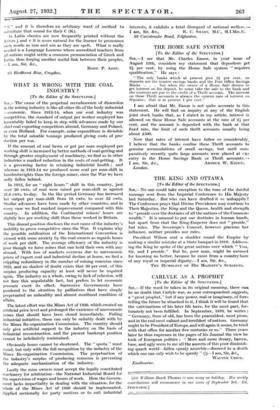WHAT IS WRONG WITH THE COAL INDUSTRY ?
[To the Editor of the SPECTATOR.]
SIR,—The cause of the perpetual recrudescence of dissension in the mining industry is like all other ills of the body industrial —economic. Since 1913-14, when our coal industry was competitive, the standard of output per worker employed has lamentably failed to keep in step with advances made by our chief coal exporting competitors abroad, Germany and Poland, or even Holland. For example; mine expenditure is divisible by the total saleable tonnage produced giving costs of pro- duction per ton.
If the amount of coal hewn or got per man employed per working shift is increased by better methods of coal-getting and through greater employment of machinery, we find as in other industries a marked reduction in the costs of coal-getting. It is a governing factor in retaining industrial health ; and whereas in 1913-14 we produced more coal per man-shift in hundredweights than the foreign miner, since the War we have sadly fallen behind.
In 1913, for an " eight hours " shift in this country, just over 20 cwts. of coal were raised per man-shift as against 21.6 cwts. to-day. In the like period Germany has increased her output per man-shift from 18 cwts. to over 32 cwts. Similar advances have been made by other countries, and in every case we find marked improvement compared with this country: In addition, the Continental miners' hours are slightly less per working shift than those worked in•Britain.
This dismal position discloses the root cause of the industry's inability to prove competitive since the War. It explains why the possible ratification of the International Convention is viewed with some anxiety by the coal owners as regards hours of work per shift. The average efficiency of the industry is poor though we have mines that can hold their own with any abroad. With loss of markets overseas due to uneconomic prices of export coal and industrial decline at home, we find a crippling redundancy in the number of mining concerns since 1923, and no shadow of doubt exists that 30 per cent. of this surplus producing capacity at least will never be required again. The industry as a whole, owing to lack of cohesion, will not face this unpalatable fact, but prefers to let economic pressure exert its effect. Successive Governments have pandered to the situation by palliatives that have simply perpetuated an unhealthy and almost moribund condition of affairs.
The latest effort was the Mines Act of 1930, which created an artificial price level and prolonged the existence of uneconomic mines that should have been closed immediately. Failing industrial initiative, these can only be suitably dealt with by the Mines Re-organization Commission. The country should only give artificial support to the industry on the basis of industrial reconstruction, and the present bankrupt position cannot be indefinitely maintained.
Obviously hours cannot be shortened. The quota " must stand, but only with the full recognition by the industry of the Mines Re-organization Commission. The perpetuation of the industry's surplus of producing concerns is preventing the adequate mechanization of the industry.
Lastly the mine owners must accept the legally constituted machinery for arbitration—the National Industrial Board for the supervision of wages and hours of work. Here the Govern- ment lacks impartiality in dealing with the situation, for the whole of the Mines Act of 1930 should be implemented. Applied sectionally for party motives or to suit industrial interests, it exhibits a total disregard of national welfare.—


























 Previous page
Previous page